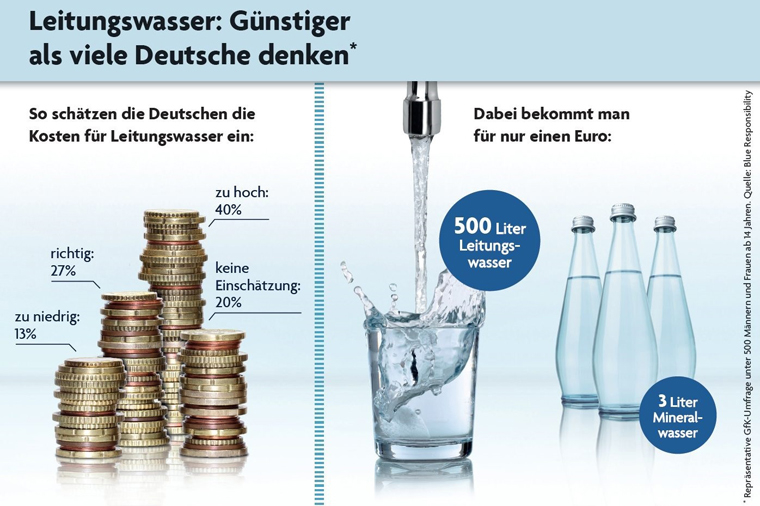Clean drinking water is our most important food and subject to particularly strict checks in Germany. But how much does a refreshing glass of tap water actually cost? A current GfK study on behalf of the Blue Responsibility initiative reveals: Only one in four Germans can estimate the price for tap water – which is 0.2 cent per litre – correctly. The majority of respondents assumed a higher price.
Reaching for the tap is a matter of course for many Germans. There is always fresh, pure water available from the tap. In addition to cooking or cleaning, it can also be used for quenching our thirst without reservations. Nine out of ten Germans drink tap water, but only few know how much this convenient refreshment costs. Only 26.7 per cent of the respondents estimated the price of tap water (0.2 cent/litre) correctly, with 31.4 per cent of men and 21.5 of women providing the right answer. This is the result of a representative survey on behalf of the Blue Responsibility initiative which is committed to the sustainable use of drinking water.
Around 40 per cent of the respondents overestimated the cost of tap water (0.5 cent to over 1 Euro) while 13 per cent expect a price that is too low (under 0.1 cent). One in five Germans don't even want to make an estimate. The age groups between 40 and 49 (32.9 %) and over 70 (34.1 %) proved to be the best informed. Only one in five in the age group between 30 and 39 were able to state the correct price range (0.1 to 0.4 cent). The survey also revealed: There was no correlation between the level of education of the respondents and the correct answer. Respondents with a secondary school education and a completed apprenticeship had the highest score (31.5 %). 26.1 per cent of respondents with a college education had the right answer. Government officials also showed a good sense for numbers with 39.1 per cent correct answers.
Tap water – an underestimated resource
Tap water is not only the best controlled food in Germany, it is also particularly cheap. “With one Euro, you can buy 500 litres of tap water, but only two to five litres of mineral water. You also don't have to lug around any heavy bottles,” Stefan Oberdörfer from Blue Responsibility explains. The precious resource should still be managed carefully, though, especially with regard to drinking water hygiene. For in Germany the promise of high quality only applies up to the connection point into the building. From there onwards, each building owner and landlord is individually responsible for the proper installation of drinking water lines. “The greatest risks for drinking water quality lurk between water meter and water outlet,” Stefan Oberdörfer continues. “Water quality can be negatively affected by, for example, stagnation, overdimensioned pipes or water heaters, incorrect temperature levels or unsuitable materials.” It is therefore particularly important that drinking water installations are planned, installed and regularly maintained by specialist firms according to the state of the art. The same applies to repairs and changes to the water installations in the building.
